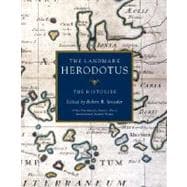
| Introductionby Rosalind Thomas Editor’s | |
| Preface by | |
| Preface by | |
| book One Book Two Book Three Book Four Book Five Book Six Book Seven Book Eight Book Nine | |
| The Athenian Government in Herodotus | |
| The Spartan State in War and Peace | |
| The Account of Egypt: Herodotus Right and Wrong | |
| Herodotean Geography | |
| Herodotus and the Black Sea Region | |
| Rivers and Peoples of Scythia | |
| The Continuity of Steppe Culture | |
| The Ionian Revolt | |
| Classical Greek Religious Festivals | |
| Ancient Greek Units of Currency, Weight, and Distance | |
| Dialect and Ethnic Groups in Herodotus | |
| Aristocratic Families in Herodotus | |
| Herodotus on Persia and the Persian Empire | |
| Hoplite Warfare in Herodotus | |
| The Persian Army in Herodotus | |
| Oracles, Religion, and Politics in Herodotus | |
| Herodotus and the Poets | |
| The Size of Xerxes’ Expeditionary Force | |
| Trireme Warfare in Herodotus | |
| Tyranny in Herodotus | |
| On Women and Marriage in Herodotus | |
| Glossary Ancient Sources | |
| Bibliography for the General Reader | |
| Figure Credits | |
| Index | |
| Reference | |
| Maps | |
| Table of Contents provided by Publisher. All Rights Reserved. |
The New copy of this book will include any supplemental materials advertised. Please check the title of the book to determine if it should include any access cards, study guides, lab manuals, CDs, etc.
The Used, Rental and eBook copies of this book are not guaranteed to include any supplemental materials. Typically, only the book itself is included. This is true even if the title states it includes any access cards, study guides, lab manuals, CDs, etc.
Excerpted from The Landmark Herodotus: The Histories by Robert B. Strassler
All rights reserved by the original copyright owners. Excerpts are provided for display purposes only and may not be reproduced, reprinted or distributed without the written permission of the publisher.